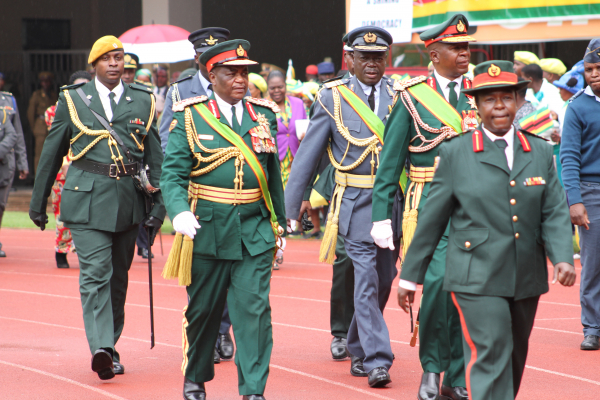
Hunger is a feeling of discomfort or weakness caused by lack of food, coupled with the desire to eat.
Tapiwa Gomo
It happens when one has not eaten in a long time.
The word “hunger” can be used in figurative speech to refer to an abnormal and extreme deficiency of the ideal, thereby, creating strong desire or craving for social, economic or political change.
When one is in the midst of extreme hunger, whatever its nature, the taste of whatever is made available to quench it becomes secondary to survival.
Once the deficit is satisfied, the mind regroups to try and make sense of the hunger situation and, intuitively, the first reaction is to celebrate survival and to credit with an unfettered indebtedness, whoever provided the life-saving situation.
Such is the nature of life.
The celebration and expression of gratitude rarely occur on account of reason or thought because it comes natural to appease those who saved.
- Chamisa under fire over US$120K donation
- Mavhunga puts DeMbare into Chibuku quarterfinals
- Pension funds bet on Cabora Bassa oilfields
- Councils defy govt fire tender directive
Keep Reading
Where thought and reason are summoned, it is often an act of investment into future rescue or the simple act of moral obligation.
The situation of our hunger for political change and how the recent change was jubilantly received masks a curious paradox – one that is both brutally cruel and unforgiveable, as it betrays the universal morals and values.
We watched, as the power that brutalised souls for nearly four decades, wore a different face to soothe the same souls for just a week.
In a flash, the minds forgot our groans, the injuries and pain in our bleeding souls under their rule for a pretentious relief.
Opinions swung from one end to another and for some, it was a full cycle.
This is because former leader, Robert Mugabe was forced to step down through the barrel of the gun.
Before the coup, there was general consensus on the baselines.
We were all hungry for change.
We all wanted Mugabe and those around him to go.
They had caused excruciating suffering.
This has been loud and clear for over two decades.
A whole political industry grew out of these voices.
But the means available to secure change were in the hands of those we also wanted out of power.
Change did not happen.
Nonetheless, many lives were lost and some people today carry scars and wounds from the trenches pursuing the change agenda.
The cause of these was not Mugabe himself, but those around him, the people who protected him and made sure he never lost elections.
We were victims for pursuing a dream for change.
They were victors because they wielded the power of the gun and had access to State resources behind the gun and against the people.
Fast forward to today, it is the same people, whose hands are dripping with the blood of innocent citizens who perished in the 1980s in Matabeleland and in the elections of 2002 and 2008, who have conjured a “pseudo liberation” to portray themselves as saints and heroes of the day.
The coup prize-giving day was evident in the Cabinet announcement.
It’s not about you, but them.
And because the ultimate prize is Mugabe’s departure, we celebrated just like that hungry person, who has just received life-saving food when they were on the verge of death due to starvation from the killers of his parents.
“We have been saved. We are free at last,” we chanted, perhaps thoughtlessly.
If we were thoughtful, we would have asked who liberated us from who, why and for whose benefit?
Over the last two weeks, I have learnt neither to try and make sense of an evolving situation and be objective in the midst of jubilation and excitement nor try to say “I told you so” in the aftermath of a pyrrhic victory.
They label you a denialist and all sorts of names.
Within a fortnight, power showed its ugly and beautiful face.
It gave us something that is nothing of what it stole from us in 37 years and confiscated it in a week.
We are still jubilant, aren’t we, as we chew the tasteless gum?
That was the most brutal and ruthless show of power, and indeed power is evil.
It orphans you when you are young.
It gives you what seems to be life-saving hope just to buy your soul.
Just when you thought you were accustomed to your struggles, it throws that empty hope at you.
Are the people who suffered during Gukurahundi massacres in the 1980s going to forgive the perpetrators because they removed Mugabe from power?
Are the people who lost their loved ones during the 2002 and 2008 elections going to forgive the perpetrators because they removed Mugabe?
Are Zimbabweans in general forgiving those who stole elections on behalf of Mugabe, their only hope for change, simply because they used the gun to remove Mugabe from power?
Mugabe was the face of a brutal machine that has, through the barrel of the gun, just conferred itself the power to govern.
And that switch of power is what others have described as either change or a step towards change.
I call it the renewal of the devil.
That is the painful reality of our political situation.
We celebrate a devil, who killed our parents because he purportedly saved us from imagined danger.
Because our souls have been brutalised, we celebrate the devil’s antics with reckless abandon.
There is no other point in the history of Zimbabwe that opposition politics is needed more than now.
Our country needs to be democratised and sanitised.
The gun still rules and the government continues to be militarised and factions are nothing but battles between dynasties.
Tapiwa Gomo is a development consultant based in Pretoria, South Africa







